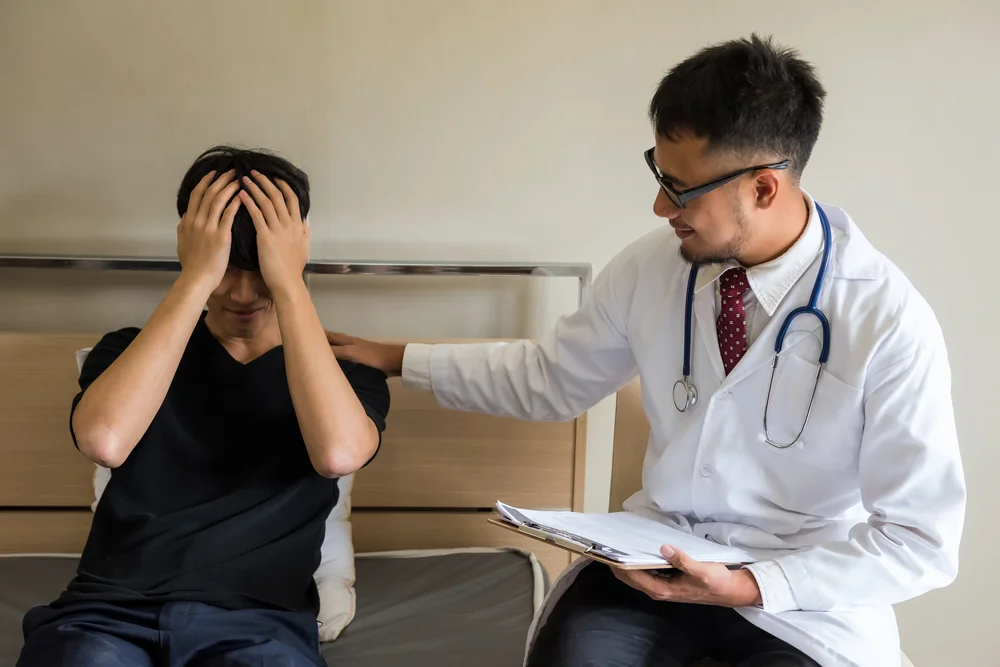Introduction
Depression is a complex mental health condition that goes far beyond occasional sadness or emotional distress. Recognizing depression symptoms early can play a vital role in managing the condition effectively. At CHMC Dubai, we believe that awareness is the first step toward healing. Understanding what depression symptoms look like—and when they require professional attention—helps individuals take control of their emotional well-being before it worsens.
What Are Depression Symptoms?
Defining Depression Symptoms
Depression symptoms are the emotional, cognitive, and physical signs that indicate the presence of a depressive disorder. They reflect changes in how a person feels, thinks, and behaves. These symptoms can vary in severity and duration, but when they persist for weeks or months, they may point to clinical depression that requires attention and care.
Why It’s Important to Recognize Symptoms Early
Early identification of depression symptoms helps prevent the condition from intensifying. The sooner an individual acknowledges these warning signs, the sooner they can seek therapy, medical help, or self-care strategies to manage the condition effectively.
Emotional and Behavioral Depression Symptoms
1. Persistent Sadness or Hopelessness
One of the most recognizable depression symptoms is ongoing sadness that doesn’t fade over time. People may feel hopeless, tearful, or emotionally numb. This emotional weight often feels inescapable and affects every aspect of daily life.
2. Loss of Interest or Pleasure in Activities
When someone stops enjoying hobbies, socializing, or favorite activities, it may indicate depression. This loss of interest, known as anhedonia, is among the core depression symptoms that suggest a deeper emotional struggle.
3. Irritability and Anger
Depression is not always about sadness. Many people—especially men—display irritability, frustration, or anger instead. These emotional outbursts are signs of internal distress and are often overlooked as potential depression symptoms.
4. Withdrawal from Social Interaction
Avoiding friends, family, or social gatherings is another key indicator. Social isolation reinforces loneliness, making recovery harder. This behavior is one of the more visible depression symptoms and should not be ignored.
Cognitive Depression Symptoms
1. Difficulty Concentrating
People with depression often find it hard to focus, remember details, or make decisions. This mental fog is one of the most common depression symptoms that can interfere with work, school, and daily tasks.
2. Negative Thinking Patterns
Depression affects thought processes, leading to excessive guilt, self-blame, or pessimism. Individuals may see everything through a negative lens, believing things will never improve. These recurring thoughts are among the most damaging depression symptoms.
3. Suicidal Thoughts or Self-Harm
In severe cases, depression may lead to thoughts of death or suicide. These are the most critical depression symptoms and require immediate professional help. Anyone experiencing such thoughts should reach out to a trusted friend, family member, or mental health expert right away.
Physical Depression Symptoms
1. Changes in Sleep Patterns
Sleep disturbances are common in depression. Some individuals struggle with insomnia—difficulty falling or staying asleep—while others oversleep yet feel exhausted. Irregular sleep is one of the key depression symptoms that reflects emotional imbalance.
2. Appetite and Weight Changes
Depression can alter appetite, leading to significant weight gain or loss. Emotional eating or lack of appetite often occurs due to disrupted mood-regulating hormones. These fluctuations are noticeable depression symptoms that connect physical health to emotional well-being.
3. Chronic Fatigue or Low Energy
Even after a full night’s rest, people with depression often feel drained and exhausted. This fatigue is not just physical but emotional and mental. Persistent tiredness is one of the most common depression symptoms that impacts motivation and daily productivity.
4. Physical Aches and Pains
Headaches, back pain, or stomach issues may occur without a clear medical reason. These unexplained physical sensations are often overlooked depression symptoms caused by prolonged stress and emotional strain.
Understanding Why Depression Symptoms Occur
1. Biological Factors
Chemical imbalances in the brain, particularly involving serotonin and dopamine, can trigger depression symptoms. Genetics may also play a role—individuals with a family history of depression are more prone to developing it.
2. Psychological and Emotional Factors
Low self-esteem, unresolved trauma, or chronic stress contribute significantly to depression symptoms. When the mind repeatedly experiences emotional pain, it can lead to distorted thinking and emotional exhaustion.
3. Environmental and Lifestyle Factors
Major life changes such as loss, financial stress, or isolation can initiate depression symptoms. Poor lifestyle habits, including lack of sleep, unhealthy diet, or substance use, can further worsen the condition.
Depression Symptoms Across Different Age Groups
1. In Children and Teens
Children and teenagers may show depression symptoms differently. Instead of sadness, they often become irritable, defiant, or lose interest in school. Early recognition helps prevent long-term emotional difficulties.
2. In Adults
Adults often experience fatigue, low motivation, and feelings of emptiness. Work stress, relationship problems, or financial issues can trigger depression symptoms that affect performance and well-being.
3. In Older Adults
Elderly individuals may confuse depression symptoms with aging. They might express forgetfulness, fatigue, or loss of appetite, mistakenly attributing them to physical decline rather than emotional distress.
The Impact of Ignoring Depression Symptoms
Ignoring depression symptoms can have serious consequences. The longer they persist, the more likely they are to disrupt personal relationships, work, and physical health. Untreated depression can also increase the risk of substance abuse, self-harm, and chronic illness. Recognizing these signs and addressing them early can prevent complications and promote recovery.
How to Manage and Treat Depression Symptoms
1. Professional Therapy
Psychotherapy, such as Cognitive Behavioral Therapy (CBT), is highly effective for treating depression symptoms. It helps individuals identify negative thought patterns and replace them with healthier perspectives.
2. Medication Support
In moderate to severe cases, antidepressant medication may be prescribed to balance brain chemicals. At CHMC Dubai, treatment is personalized to ensure that medications are used safely and effectively.
3. Lifestyle Changes
Exercise, proper nutrition, and sufficient rest play a vital role in managing depression symptoms. Simple changes like regular physical activity and mindfulness can greatly improve emotional stability.
4. Support Systems
Connecting with supportive friends, family, or therapy groups can help individuals feel less isolated. Emotional connection is one of the strongest defenses against worsening depression symptoms.
When to Seek Help for Depression Symptoms
If depression symptoms persist for more than two weeks and interfere with daily life, professional help should be sought. Using tools like the German Depression Self-Test in Dubai can provide a better understanding of one’s emotional state, but consultation with a licensed mental health expert remains essential for accurate diagnosis and treatment.
Conclusion
Recognizing and addressing depression symptoms early can be life-changing. From persistent sadness and fatigue to changes in appetite and concentration, each symptom provides valuable insight into one’s mental health. At CHMC Dubai, we encourage individuals to use self-assessment tools and seek expert support to understand their condition better. Depression is treatable, and no one has to face it alone. By taking proactive steps toward awareness and treatment, individuals can overcome depression symptoms, regain emotional balance, and restore a sense of purpose and happiness in their lives.



